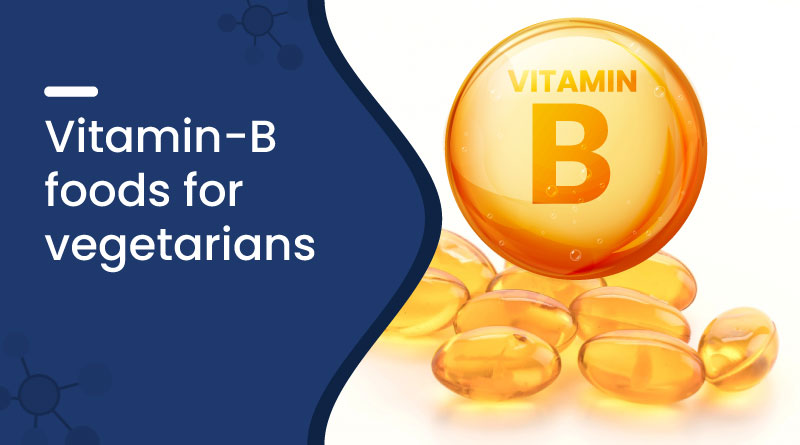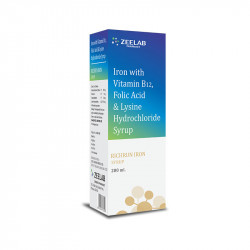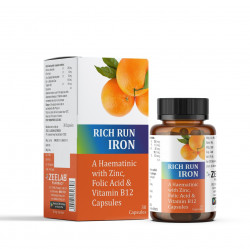Vitamin B Foods for Vegetarians | Best Plant-Based Sources


Vitamin B complex is a group of essential nutrients that play a crucial role in energy production, brain function, and overall well-being. For vegetarians, getting enough vitamin B can sometimes be challenging since some B vitamins are primarily found in animal products. This blog explores why vitamin B is important, the risks of deficiency, and the best vegetarian food sources to keep your health on track.
Why Is Vitamin B So Important?
Vitamin B refers to a group of eight water-soluble vitamins, including B1 (thiamine), B2 (riboflavin), B3 (niacin), B5 (pantothenic acid), B6 (pyridoxine), B7 (biotin), B9 (folate), and B12 (cobalamin). These vitamins support vital processes such as:
- Converting food into energy
- Maintaining healthy brain and nerve function
- Supporting red blood cell formation
- Enhancing skin, hair, and eye health
Also read: Vitamin B Complex for Skin Health
Signs and Risks of Vitamin B Deficiency
Lack of adequate vitamin B can lead to various symptoms and health risks, including:
- Fatigue and weakness
- Numbness or tingling in hands and feet
- Poor memory and concentration
- Anemia (low red blood cells)
- Mood changes like depression or irritability
- Skin problems such as cracking or redness around the mouth
Vegetarians may be more prone to vitamin B12 deficiency since it is mostly found in animal products. Deficiency in this vitamin can cause neurological issues if untreated.
Best Vitamin B Rich Foods for Vegetarians
Since natural vegetarian sources of B12 are limited, supplementation or fortified foods are often recommended.
| Vitamin | Functions | Vegetarian Sources |
|---|---|---|
| B1 (Thiamine) | Helps convert food into energy, supports nerve and muscle function | Whole grains (brown rice, oats), legumes (lentils, black beans), nuts and seeds (sunflower seeds, flaxseeds) |
| B2 (Riboflavin) | Aids energy production, supports healthy skin and eyes, protects from oxidative stress | Almonds, spinach, mushrooms |
| B3 (Niacin) | Improves digestion, supports brain function, promotes healthy cholesterol and skin | Peanuts, brown rice, sun-dried tomatoes |
| B5 (Pantothenic Acid) | Converts food into energy, supports hormone production, aids red blood cell synthesis | Avocados, sweet potatoes, lentils |
| B6 (Pyridoxine) | Supports brain development, neurotransmitter production, red blood cell formation, immune function | Bananas, chickpeas, potatoes |
| B7 (Biotin) | Essential for hair, skin, nails, and food-to-energy conversion | Cauliflower, nuts, oats |
| B9 (Folate) | Crucial for DNA synthesis and preventing birth defects | Dark leafy greens (spinach, kale), beans, asparagus |
| B12 (Cobalamin) | Necessary for red blood cell formation and nervous system health | Fortified plant-based milks (soy, almond), fortified cereals, nutritional yeast |
Impact of Vitamin B Deficiency on Mental Health
Vitamin B vitamins, especially B6, B9 (folate), and B12, play a vital role in brain function and mood regulation. A deficiency in these vitamins can lead to symptoms such as depression, irritability, confusion, and memory problems. Maintaining adequate levels supports neurotransmitter production, helping to improve mood and cognitive health.
You can eat the following:
- B6: Bananas, chickpeas, potatoes
- Folate (B9): Spinach, lentils, asparagus
- B12: Fortified plant-based milks, fortified cereals, nutritional yeast
Also read: Vitamin B12 for Brain Health and Sharp Memory
Tips to Improve Vitamin B Intake for Vegetarians
- Include a variety of whole grains, legumes, nuts, and vegetables in your diet.
- Check labels for fortified foods enriched with vitamin B12 and folic acid.
- Avoid overcooking vegetables to preserve B vitamins.
- Maintain a balanced diet for overall nutrient synergy.
- Consider B12 supplements after consulting a healthcare provider.
Also read: Best Vitamin B12 Tablets and Supplement in India
Conclusion
Vitamin B is essential for energy, brain health, and overall well-being, especially for vegetarians who may be at risk of certain deficiencies like B12. Including a variety of vitamin B-rich foods, fortified products, and supplements when needed can help maintain good health. Choosing wholesome foods ensures you meet your body’s nutritional demands.
Frequently Asked Questions (FAQs)
Q. Can vegetarians get enough vitamin B12 without supplements?
A. This can be challenging as vitamin B12 is primarily found in animal-based foods. Fortified foods and supplements can help meet daily requirements.
Q. Which vitamin B is most difficult for vegetarians to obtain?
A. Vitamin B12 is the hardest to obtain from a vegetarian diet, as it is naturally found in animal-based foods. Fortified foods or supplements are often necessary.
Q. Can vitamin B deficiency cause mental health problems?
A. Yes. Deficiency in B6, B9 (folate), and B12 can lead to mood changes, depression, memory problems, and confusion.
Q. Which supplement can help vegetarians meet their vitamin B needs?
A. Vitazem Veg Tabs provide essential B vitamins, making it easy for vegetarians to maintain energy and overall health.
Q. Can I take B vitamins safely during pregnancy?
A. Yes, especially folate (B9), which is crucial to prevent neural tube defects. Pregnant women should follow medical advice on supplementation.
Iron (60 mg) + Folic Acid (1 mg) + Vitamin B12 (0.005 mg) + Lysine (70 mg)
200 ml. Syrup
Ferrous Fumarate 250mg + Folic Acid 1.5mg + Zinc Sulphate Monohydrate 50mg Eq. to Elemental Zinc 18.2 mg. + Vitamin B12 10mcg
30 Capsules per jar
Recent Blogs
Disclaimer : Zeelab Pharmacy provides health information for knowledge only. Do not self-medicate. Always consult a qualified doctor before starting, stopping, or changing any medicine or treatment.
Related Products
Need Medicines Quick?
Share location to check quick delivery serviceability.
Change Location
Location Access Needed
Your location appears to be blocked or disabled.
Please enable the location from your browser or
device settings.

₹ 0
0
Items added
Quick Links
Categories
Our Policies
2026 Copyright By © Zeelab Pharmacy Private Limited. All Rights Reserved
Our Payment Partners

 Added!
Added!
|
|















